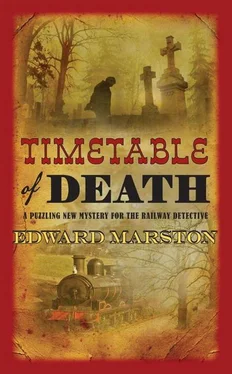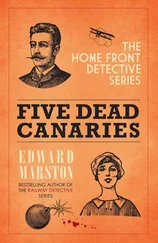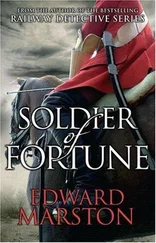Edward Marston - Timetable of Death
Здесь есть возможность читать онлайн «Edward Marston - Timetable of Death» весь текст электронной книги совершенно бесплатно (целиком полную версию без сокращений). В некоторых случаях можно слушать аудио, скачать через торрент в формате fb2 и присутствует краткое содержание. Год выпуска: 2015, ISBN: 2015, Издательство: ALLISON & BUSBY, Жанр: Исторический детектив, на английском языке. Описание произведения, (предисловие) а так же отзывы посетителей доступны на портале библиотеки ЛибКат.
- Название:Timetable of Death
- Автор:
- Издательство:ALLISON & BUSBY
- Жанр:
- Год:2015
- ISBN:9780749018122
- Рейтинг книги:4 / 5. Голосов: 1
-
Избранное:Добавить в избранное
- Отзывы:
-
Ваша оценка:
- 80
- 1
- 2
- 3
- 4
- 5
Timetable of Death: краткое содержание, описание и аннотация
Предлагаем к чтению аннотацию, описание, краткое содержание или предисловие (зависит от того, что написал сам автор книги «Timetable of Death»). Если вы не нашли необходимую информацию о книге — напишите в комментариях, мы постараемся отыскать её.
Timetable of Death — читать онлайн бесплатно полную книгу (весь текст) целиком
Ниже представлен текст книги, разбитый по страницам. Система сохранения места последней прочитанной страницы, позволяет с удобством читать онлайн бесплатно книгу «Timetable of Death», без необходимости каждый раз заново искать на чём Вы остановились. Поставьте закладку, и сможете в любой момент перейти на страницу, на которой закончили чтение.
Интервал:
Закладка:
‘You and Colbeck were sent to Derby to solve a heinous crime. I don’t want the pair of you poking into a misalliance between a gardener and a lady who should have known better. This is work for detectives of another kind,’ said Tallis with utter contempt. ‘I refer to that odious breed of private investigators that enjoy peeping through keyholes and eavesdropping on conversations. We are dealing with murder, Sergeant, not with sexual peccadilloes.’
‘The inspector called it a true romance.’
‘Well, he’d better not do so in my hearing.’
‘They must have loved each other to take such a risk.’
‘Don’t you dare invite me to speculate on the stratagems to which they resorted,’ said Tallis, leaning forward aggressively. ‘This attachment was never going to be sanctified by marriage. All that it did was to estrange a young woman from her family and give a dissolute fast bowler a reason to hate her father.’
‘Oh, he wasn’t dissolute, sir.’
‘Don’t argue with me, you idiot!’
‘Inspector Colbeck described him as a responsible person.’
‘And look at what he was responsible for!’
‘It happened years ago, sir.’
‘He ruined this young lady’s life and drove her apart from her family. And now,’ he continued, glancing at the report, ‘he’s had the gall to get married.’
‘It’s not a crime,’ retorted Leeming, emboldened by the scorn in Tallis’s voice. ‘If it is, you must arrest the inspector and me because we’ve both found someone with whom to share our lives. What happened between Gerard Burns and Lydia Quayle has a direct bearing on this case. One of them has been found,’ he stressed. ‘It’s important that we track down the other.’
Tallis was so stunned by the unaccustomed forthrightness of his visitor that he could find nothing to say. Instead, he scanned the report again so that he could take in the fine detail. When he’d finished, he looked up at Leeming.
‘As you wish, Sergeant,’ he said, chastened. ‘Find the lady.’
Though Ilkeston was in Derbyshire, it was much closer to Nottingham than it was to the county town that Colbeck had just left. It was an archetypal industrial community, owing its wealth to coal, ironworks and textile manufacture. When he got his first look at the place, Colbeck despaired of ever finding a cricket pitch there. It was so defiantly urban that the few trees he could see were like nervous guests afraid to step fully into a room. The ironworks stood at New Stanton to the south of the town and it soon made its presence felt. One of the three blast furnaces on the banks of the Nutbrook Canal suddenly boomed out and made the ground quake. Colbeck mused that even an experienced bowler like Gerard Burns would find it hard to maintain the rhythm of his run-up if disturbed by the deafening noise from the Stanton Ironworks.
The cab driver had a pleasant surprise for him. There was indeed a cricket pitch half a mile out of the town and he spoke fondly of it. Colbeck asked to be taken there. Having watched matches at Lord’s Cricket Ground in London, he was bound to compare the Ilkeston equivalent unfavourably with it. Small, oval and encircled by trees, it also served as a park and a few tethered goats were grazing on it. Yet it was relatively flat and had a pavilion of sorts, a long wooden shed with a verandah in front of it. An old man was coming out of the pavilion. When Colbeck approached him, he discovered that he was talking to the groundsman.
‘How often are matches played here?’
‘Not often, sir.’
‘Is there a regular team here?’
‘Not really, sir.’
‘How much money is spent on the upkeep of the ground?’
‘Not much, sir.’
‘I see that you’ve got goats here.’
‘Better’n sheep, sir — far less dung.’
There was an element of pride in the man’s voice. What was a rather sorry pitch in Colbeck’s eyes was a source of pleasure to him. It was he who kept the grass cut and marked everything out. Ramshackle as it was, the pavilion had a fairly recent coat of white paint.
‘You had a match here a few days ago.’
The man chuckled. ‘We beat a team from Matlock, sir.’
‘Why was that?’
‘We ’ad best bowler in’t county.’
‘Gerard Burns?’
‘Aye, thass ’im.’
He went into rhapsodies about the game and described how none of the Matlock team could handle the speed, aggression and accuracy of Burns’s bowling. The Ilkeston team was gathered from the surrounding area. Miners, ironworkers and those employed in textile factories showed little interest in cricket. They saw it as a game for gentlemen and preferred rougher sports. Yet a cluster of spectators had turned out to watch Ilkeston destroy Matlock.
‘It were a treat, sir.’
‘I wish I’d seen Burns in action,’ said Colbeck. ‘I’ve heard a lot about him.’
‘The lad were champion.’
‘What happened after the game?’
‘We drank till we dropp’d.’
The old man’s reminiscences were so filled with excitement and spiced with the local dialect that Colbeck didn’t understand much of what he said but he heard the salient details. Burns had been invited to join the team by someone who’d seen him play for Nottinghamshire and knew of his move to Melbourne. It had taken time to persuade the gardener to represent Ilkeston as a guest player but, once he’d committed himself, he gave of his best. The celebrations went on into the evening and Burns had drunk more than his share of beer.
‘Then he went back to Melbourne, I suppose,’ said Colbeck.
‘No, sir. I were on’t cart wi’ ’m when it took us ter station.’
‘So where did he go?’
‘Derby.’
Colbeck felt a minor thrill of discovery. Flushed with alcohol, Gerard Burns sounded as if he had been in the right place and at the right time to kill the man he hated. How he had contrived to get Vivian Quayle to Spondon was not so easily explained. Nobody had been able to tell Colbeck where exactly Quayle had been in the twenty-four hours leading up to his murder. He was as ubiquitous as he’d been industrious. Was it possible that Burns had somehow become aware of the man’s movements that night? He had, after all, returned to what was part of the Quayle fiefdom. The coal mines in Ilkeston and beyond were owned by the family. They employed large numbers of people from the town. Burns would have been well aware of that. Was that the reason he’d come to Ilkeston in the first place?
Colbeck’s speculations took him all the way back to the railway station. When he descended from the cab, he paid the driver and thanked him for his help. He was just about to walk away when a carriage rolled past nearby. The passenger could be seen clearly. He appeared to be wearing funereal garb but it was his top hat that made Colbeck stare. Tall and with a delicately curved brim, it looked remarkably like the one missing from the murder victim. At that moment, the passenger turned his head idly in the direction of the detective and there was a searing moment of recognition between them.
Colbeck was looking at the face of Stanley Quayle.
CHAPTER ELEVEN
When Caleb Andrews called in unexpectedly at the house, his daughter was on tenterhooks, fearing that Victor Leeming would soon turn up as well and that the two men would meet. There would be no way to get rid of her father then. He’d insist on knowing the latest developments in the case and — after a volley of derisive comments about the Midland Railway — he’d offer his help in the investigation. Madeleine was therefore greatly relieved when he announced that he was off to visit a former colleague from the LNWR.
‘He should have retired years ago,’ said Andrews, disparagingly. ‘Silas always had poor eyesight and he was slow to react to things. You can’t be in charge of a locomotive when you’re like that. It’s how accidents happen and he’s had a few of those. I was different,’ he went on, thrusting out his chest. ‘My eyesight was always perfect and I had a quick brain. I’m still as fit as I always was, Maddy. I could go back to work tomorrow.’
Читать дальшеИнтервал:
Закладка:
Похожие книги на «Timetable of Death»
Представляем Вашему вниманию похожие книги на «Timetable of Death» списком для выбора. Мы отобрали схожую по названию и смыслу литературу в надежде предоставить читателям больше вариантов отыскать новые, интересные, ещё непрочитанные произведения.
Обсуждение, отзывы о книге «Timetable of Death» и просто собственные мнения читателей. Оставьте ваши комментарии, напишите, что Вы думаете о произведении, его смысле или главных героях. Укажите что конкретно понравилось, а что нет, и почему Вы так считаете.












